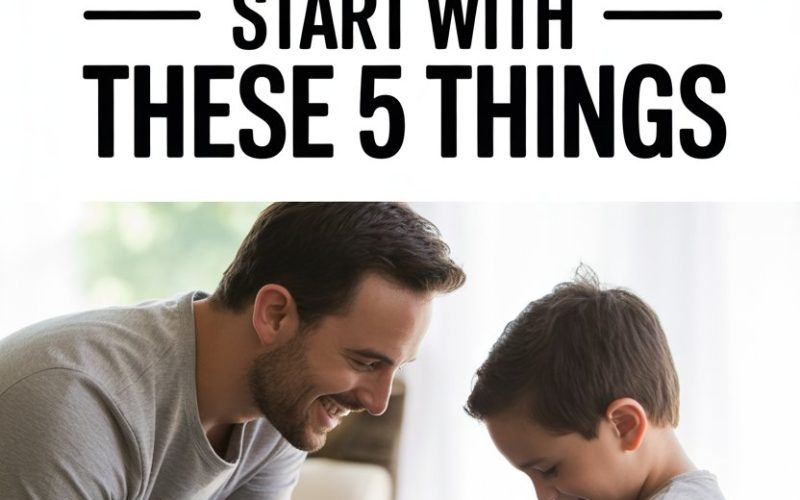Raising a good man. The phrase alone can cue nervous laughter, a tight chest, and a sudden desire to Google “where do I even begin.”
If you’re raising sons—whether they’re currently toddling in mismatched socks or already considering shaving—you probably feel the weight of the job. The world needs decent men. Scratch that: it’s desperate for them.
Breathe easy. Good men aren’t hatched; they’re made.
And you, busy parent, wield far more influence than you think. Here are five places to start.
1. Model Respect—For Everyone (Even the Annoying Ones)
You want your son to grow up with a moral compass that points toward decency? Show him what respect looks like in real time.
Children aren’t born knowing how to treat people well—they learn it from their closest adults, even when those adults are muttering at the slow barista.
If he sees you thank the bus driver, apologize when you mess up, chat kindly to the neighbour who never returns your bins—he learns that respect isn’t conditional.
It’s not reserved for people who look like you, vote like you, or agree with your taste in pizza toppings.
Small acts add up. If you catch yourself grumbling about the “idiot in traffic,” catch yourself (and, if appropriate, say so out loud). Kids don’t expect perfection, but they notice when grown-ups own their mistakes.
Research from the University of Michigan found that children whose parents model warmth and respect are more likely to develop empathy themselves.
2. Talk About Feelings—His and Yours
Little boys are told, in a hundred tiny ways, to “toughen up.” Tears are for later. Or never. But the world’s best men know how to name their feelings without a side of shame.
Name your own feelings, even the messy ones. “I’m frustrated because my day was bananas.” “I’m sad my friend moved away.” The less mysterious emotions seem, the less threatening they are.
Boys who grow up talking about feelings become men who can handle their own—and others’—emotions with grace.
Encourage him to share too, even if it starts with just, “That was hard.” If he clams up, don’t poke him with a stick (or more questions)—sometimes boys need to let things settle before they talk.
Try a walk, a game, or a car ride. Some kids open up when eye contact is optional.
A 2021 study from Harvard Graduate School of Education links regular family conversations about emotions with kids’ emotional intelligence and resilience.
3. Teach Boundaries and Consent—Early, Clearly, Repeatedly
You can’t raise a good man without tackling consent and boundaries. This starts way before dating is on the horizon.
Teach him that his body is his—and others’ bodies are theirs. This means he gets to say no to hugs, tickles, wrestling, or anything else, and you’ll back him up.
It also means respecting other people’s “no,” even if he really wanted that bear hug from Gran.
Clear, age-appropriate conversations about consent can start in preschool. “You don’t have to kiss Auntie goodbye if you don’t want to.” “Did your friend say it was okay to play that game?”
Role-play scenarios if it helps. Make it as normal as brushing teeth.
The NSPCC recommends talking about boundaries early and often, weaving it into daily life.
4. Challenge Stereotypes—Theirs, Yours, and the World’s
Pink is just a colour. Tears are just water. And real men? They can be gentle, silly, creative, or obsessed with miniature trains, and still be 100% bona fide blokes.
Kids absorb stereotypes like sponges absorb spilled Ribena. If he hears “boys don’t cry,” “men are tough,” or “that’s for girls” often enough, he’ll believe it, even if you’re doing your best to counteract it at home.
Call out stereotypes when you spot them. “That advert’s a bit daft—why shouldn’t boys like unicorns?” “Not all dads are useless at cooking, mate, watch me whip up these pancakes.”
If he’s drawn toward something unexpected (ballet, baking, nail polish), cheer him on.
Invite male role models who break the mould—nurses, artists, stay-at-home dads, men who love poetry or gardening. The more “good men” he sees, the more he’ll believe he can define manhood on his own terms.
5. Make Kindness and Responsibility Non-Negotiable
Kindness isn’t just a slogan for bumper stickers or tea towels. It’s the daily glue that holds together families, classrooms, and the entire planet.
Good men show up for others. They pitch in, pick up after themselves, and don’t treat kindness as a performance for praise.
This starts small—feeding the cat, sharing the last biscuit, helping a friend fix a bike. Don’t just do these things for him; invite him to help.
Responsibility isn’t just about chores (though, yes, the bins still need to go out). It’s about owning up when he’s messed up—even if it’s just confessing to the last smudge of chocolate on his sleeve.
Praise effort, not perfection. Kids who know it’s okay to make mistakes are the ones who step up, fix things, and try again.
According to child psychologist Dr. Michele Borba, children given age-appropriate responsibilities and praised for their kindness are more likely to develop into empathetic, capable adults.
Building Good Men, One Messy Day at a Time
There’s no single recipe for raising good men, but none of this requires perfection. You will lose your cool. You will say the wrong thing.
Your son will, at some point, refuse to wear actual trousers to a family event.
What matters is that you keep showing up. Show respect. Talk about feelings. Make consent and boundaries normal, not awkward. Smash through stereotypes with a sledgehammer (or at least a pointed eyebrow).
Make kindness and responsibility the bare minimum, not the exception.
The world throws all sorts of nonsense at our sons. Your home can be the place where he learns what being a good man actually means.
And who knows? Maybe, one day, he’ll be the bloke who thanks the bus driver, who wipes away a friend’s tears, who offers the last biscuit. Maybe he’ll even put out the bins without being asked.
Miracles do happen.




